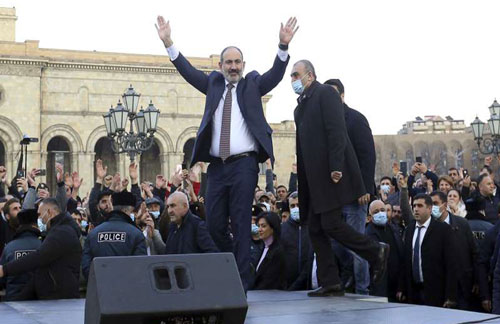Yerevan, Armenia
Tensions rose in Armenia on Thursday after the country’s prime minister accused the armed forces of attempting a coup, as thousands gathered on the streets to protest in the country’s capital.
Thousands marched through the streets of the capital Yerevan in support of Prime Minister Pashinyan, with the opposition urging him to step down to avoid bloodshed or even civil war.
President Armen Sarkisian, whose role is largely symbolic, said he was taking urgent steps to try to defuse the crisis, calling on all involved to “show restraint and common sense.”
Under pressure for his handling of the conflict over the disputed Nagorno-Karabakh region, Pashinyan has ignored repeated calls to resign for losing swathes of territory to Azerbaijan in the war.
After largely backing the prime minister for months, the military´s general staff on Thursday joined calls for him to step down, saying in a statement that he and his cabinet “are not capable of taking adequate decisions”.
Pashinyan hit back with an accusation that top brass were mounting an “attempted military coup” and fired the chief of the general staff Onik Gasparyan.
Hundreds of supporters then joined Pashinyan to march through central Yerevan, chanting “Nikol Prime Minister!”
Speaking to supporters through a megaphone, Pashinyan called for calm, as dozens of police deployed outside the main government offices.
“The situation is tense, but we must agree that there cannot be clashes,” said Pashinyan, who was joined at the march by his wife, daughters, ministers and security detail.
He said the situation in the country was under control and that the military´s call had been an “emotional reaction” to his firing the previous day of the deputy chief of the general staff Tigran Khachatryan.
Khachatryan had ridiculed claims by Pashinyan that Iskander missiles supplied by Russia — Armenia´s main military ally — had failed to hit targets during the war over Nagorno-Karabakh.
Armenia’s opposition — who have been calling for Pashinyan´s resignation since a ceasefire deal in November — urged him to heed to military´s call.
“We call on Nikol Pashinyan not to lead the country towards civil war and to avoid bloodshed.
Pashinyan has one last chance to avoid turmoil,” Prosperous Armenia, the country´s largest opposition party, said in a statement.
Prosperous Armenia and another opposition party, Bright Armenia, called for the holding of an extraordinary session of parliament, which is controlled by Pashinyan´s allies.
Armenia´s influential Apostolic Church called for all sides to hold talks to resolve the crisis, “for the sake of our homeland and people”.
Moscow also expressed concern, with Kremlin spokesman Dmitry Peskov saying: “Naturally we call for calm.”
Turkish Foreign Minister Mevlut Cavusoglu also strongly condemned what he said was an “attempted coup in Armenia”. “We are absolutely against coups and coup attempts anywhere in the world.”
Pashinyan has been under pressure since he signed the peace deal brokered by Russia that ended the conflict over Nagorno-Karabakh, an ethnic Armenian region that broke from Azerbaijan´s control during a war in the early 1990s.
Fresh fighting erupted over the region in late September with Azerbaijani forces backed by ally Turkey making steady gains.
After six weeks of clashes and bombardments that claimed some 6,000 lives, a ceasefire deal was signed that handed over swathes of territory to Azerbaijan and allowed for the deployment of Russian peacekeepers.
Azerbaijan regained control of several districts around Nagorno-Karabakh that the region´s separatist forces had seized in the 1990s war, as well as the strategically and symbolically important town of Shusha.
The agreement was seen as a national humiliation for many in Armenia, though Pashinyan has said he had no choice but to agree or see his country’s forces suffer even bigger losses.
It was met with protests in the capital Yerevan, where demonstrators stormed government offices on the night it was signed and have continued to regularly gather.
Pashinyan has rejected calls to resign and for early elections despite the building pressure.
The 45-year-old former newspaper editor came to power spearheading peaceful protests in 2018 and initially brought a wave of optimism to Armenia, a deeply impoverished ex-Soviet state that also borders Iran, Georgia and Turkey.
But his handling of the war has provoked fierce criticism from Pashinyan’s political opponents including former leader Serzh Sarkisian who was forced to resign in 2018.
Ex-president Robert Kocharyan on Thursday also said he should resign.
“The authorities who lost the war and ceded our lands must go,” said Kocharyan, who was president from 1998 to 2008.—AP










